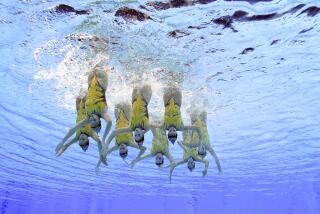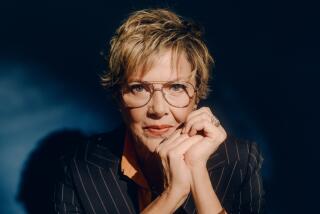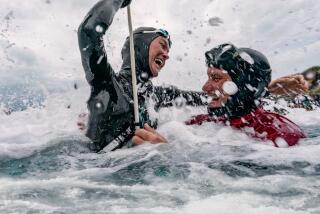At 90, Krahn Still Takes the Plunge : Diving: As a U.S. Masters’ national indoor champion, she is executing moves like youngsters.
- Share via
LAGUNA HILLS — Let’s run a history check to put Viola Krahn’s athletic career in perspective.
When Krahn first started swimming and diving competitively, Babe Ruth was turning the New York Yankees into a baseball dynasty. Jack Dempsey ruled boxing. American women had just been given voting rights. Movies were silent.
The Roaring ‘20s were on their way, and Krahn was ready for the ride. Now 90, she’s still going strong . . . and still diving.
In April, Krahn won the three-meter and one-meter springboard events in her age group at the U.S. Masters’ national indoor diving competition in Milwaukee. Of course, she was the only competitor in her classification, but the mere fact that she remains active in the sport is a testimony to her tenacity and talent.
“I’m only diving against my own record now,” Krahn said. “I have a wonderful time at the meets.”
She’s not the only one. Those who frequently watch Krahn dive, including Eldin Onsgard, former Los Angeles Pierce College swimming and diving coach, are amazed.
“She’s just incredible,” said Onsgard, who has played host to an annual invitational masters diving tournament at Pierce the past 13 years. Krahn has won in her age group every time. “It goes to show you the human spirit. She’s doing stuff the young kids are doing.”
Krahn likes to downplay her diving accomplishments but says she takes the competitions seriously. She belongs to the Laguna Niguel Crown Valley Divers club and trains with best friend and fellow masters’ diver Patty Fulton, 72, each serving as the other’s coach. They schedule their practice sessions according to the importance of the upcoming meets.
“Because of my age, I only have to do four dives (on each board),” Krahn said. “I do a front twist, a back twist, an inward dive and a straight dive. . . . I’m still striving for perfection.”
Of those, Krahn said the back twist and the inward dives are her least favorite for two reasons: In one, it’s difficult to please the judges and in the other, disaster is only a few inches away.
“The back dive with a half twist is tough because if you don’t twist enough, they (judges) say you failed your dive, and if you twist too much, they say you failed, too,” Krahn said. “The only dive I’m concerned about is the inward dive, because you have to push back and get your buns up and back to come forward and clear the board.”
On the inward dive, the diver stands on the board or platform, her back toward the water. She then jumps away from the board and pushes up her derriere while her face comes forward--toward the board--as she descends for a head-first entry. If executed incorrectly, the dive can have devastating consequences. Krahn said a masters diver she knows recently suffered facial fractures when he hit the board during an inward dive.
Those mishaps, however, don’t deter Krahn. Fear is something she apparently never really experienced, even as a tomboy growing up in Arizona.
Born in St. Louis on Dec. 29, 1901, Krahn was the only child of Charles and Emma Cecilia Hartmann. When she was 3, the family moved to Phoenix after her father was thought to have contracted tuberculosis, a diagnosis Krahn said was discounted by other doctors years later. Krahn soon began to explore and enjoy the new surroundings with the encouragement of her parents.
“My parents were outdoor people,” Krahn said. “I could try anything. We would climb rocks and ride horses bareback. My mother was 40, and she would play baseball and basketball and tennis with the neighborhood kids. My parents never pampered me. I don’t ever remember them saying, ‘Be careful.’ ”
In 1921, the family moved to Los Angeles, and Krahn joined the L.A. Athletic Club so she could swim and dive. It was there that she met Fred Cady, who coached diving at USC and coached the U.S. team at several Olympics. It was also at USC that she began to compete. She won junior national diving championships in 1922, ’23 and ’24 and some swimming championships. But she stopped competing in 1924 when she married Cady.
“Maybe it was a strange notion, but I believed that when you were married, you were the lady of the house, and the man went out to work,” Krahn said. “Even though I never had children, I still believed the woman took care of the household. But if I had to do it again, I’d go to every (swim) meet (with Cady) and put my two cents in and get into trouble, I suppose.”
After Cady died in 1960, Krahn worked for a while as a secretary. She moved to Leisure World in Laguna Hills eight years later and met her second husband, Fred Krahn, during a July 4th party hosted by mutual friends. They were married from 1970 until he died in 1986.
“I started talking to Fred and found out we were born on the same day about four hours apart. He was from Galveston, Tex.,” Krahn said. “One thing led to another. We got along just great.”
With her husband’s support, Krahn returned to diving in 1978 after a longtime friend who was involved with the masters program encouraged her to join. She has been at it since, winning numerous national and international events.
“It was incredible how everything (about diving) just came back to me,” said Krahn, who will compete at the U.S. masters national outdoor championships in August at the Rose Bowl pool. “I’ve had a great time doing it. In the nationals, they come from all over the United States. We even have a girl that comes from Mexico and one from Australia. It’s a lot of fun since you haven’t seen each other for a while.”
Many of Krahn’s mementos from diving are displayed in her Leisure World home, which contains numerous Navajo Indian paintings and artifacts. Several of the paintings depicting Navajos were done by Cady. There are also photographs of Olympic swimming champion Duke Kahanamoku and medals won by him at the Southern Pacific Swimming championships, and an Olympic silver medal won by Krahn’s friend, Georgia Coleman, in the platform competition at the 1928 Games in Amsterdam.
An upright piano hugs a living-room wall, a reminder of how her mother wanted Krahn to embrace a career in music.
“My mom played the trombone in the Glendale Symphony Orchestra,” Krahn said. “She just loved music but I was kind of a disappointment to her in that way. She started me out on piano but I didn’t like the scales. I took lessons until I was 12 and it was so boring. Now I play by ear.”
Several feet away from the piano, hanging on a hallway wall, are the cowboy hats Krahn wears when she travels with Fulton to dude ranches near Phoenix and Tucson. That’s one endeavor she finds far from boring.
“The trips I really like are when we go to the dude ranches in November,” said Krahn, who doesn’t have any surviving relatives. “We ride mules and we have barbecues. We have a lot of friends we see there. Patty and I share the driving. It’s funny because sometimes people ask me, ‘You are still driving?’ ”
And if they dropped the “r” from driving, they’d be shocked at what else Krahn is still doing.
More to Read
Go beyond the scoreboard
Get the latest on L.A.'s teams in the daily Sports Report newsletter.
You may occasionally receive promotional content from the Los Angeles Times.










